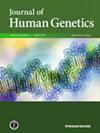Weighted burden analysis of rare coding variants in 470,000 exome-sequenced UK Biobank participants characterises effects on hyperlipidaemia risk
IF 2.6
3区 生物学
Q2 GENETICS & HEREDITY
引用次数: 0
Abstract
A previous study of 200,000 exome-sequenced UK Biobank participants investigating the association between rare coding variants and hyperlipidaemia had implicated four genes, LDLR, PCSK9, APOC3 and IFITM5, at exome-wide significance. In addition, a further 43 protein-coding genes were significant with an uncorrected p value of <0.001. Exome sequence data has become available for a further 270,000 participants and weighted burden analysis to test for association with hyperlipidaemia was carried out in this sample for the 47 genes highlighted by the previous study. There was no evidence to implicate IFITM5 but LDLR, PCSK9, APOC3, ANGPTL3, ABCG5 and NPC1L1 were all statistically significant after correction for multiple testing. These six genes were also all exome-wide significant in the combined sample of 470,000 participants. Variants impairing function of LDLR and ABCG5 were associated with increased risk whereas variants in the other genes were protective. Variant categories associated with large effect sizes are cumulatively very rare and the main benefit of this kind of study seems to be to throw light on the molecular mechanisms impacting hyperlipidaemia risk, hopefully supporting attempts to develop improved therapies.对英国生物库中 47 万名外显子组测序参与者的罕见编码变异进行加权负担分析,以确定其对高脂血症风险的影响。
之前对 20 万名英国生物库参与者进行的一项外显子组测序研究调查了罕见编码变异与高脂血症之间的关系,结果发现 LDLR、PCSK9、APOC3 和 IFITM5 这四个基因在整个外显子组中具有显著性。此外,还有 43 个蛋白编码基因具有显著性,其未校正 p 值为
本文章由计算机程序翻译,如有差异,请以英文原文为准。
求助全文
约1分钟内获得全文
求助全文
来源期刊

Journal of Human Genetics
生物-遗传学
CiteScore
7.20
自引率
0.00%
发文量
101
审稿时长
4-8 weeks
期刊介绍:
The Journal of Human Genetics is an international journal publishing articles on human genetics, including medical genetics and human genome analysis. It covers all aspects of human genetics, including molecular genetics, clinical genetics, behavioral genetics, immunogenetics, pharmacogenomics, population genetics, functional genomics, epigenetics, genetic counseling and gene therapy.
Articles on the following areas are especially welcome: genetic factors of monogenic and complex disorders, genome-wide association studies, genetic epidemiology, cancer genetics, personal genomics, genotype-phenotype relationships and genome diversity.
 求助内容:
求助内容: 应助结果提醒方式:
应助结果提醒方式:


